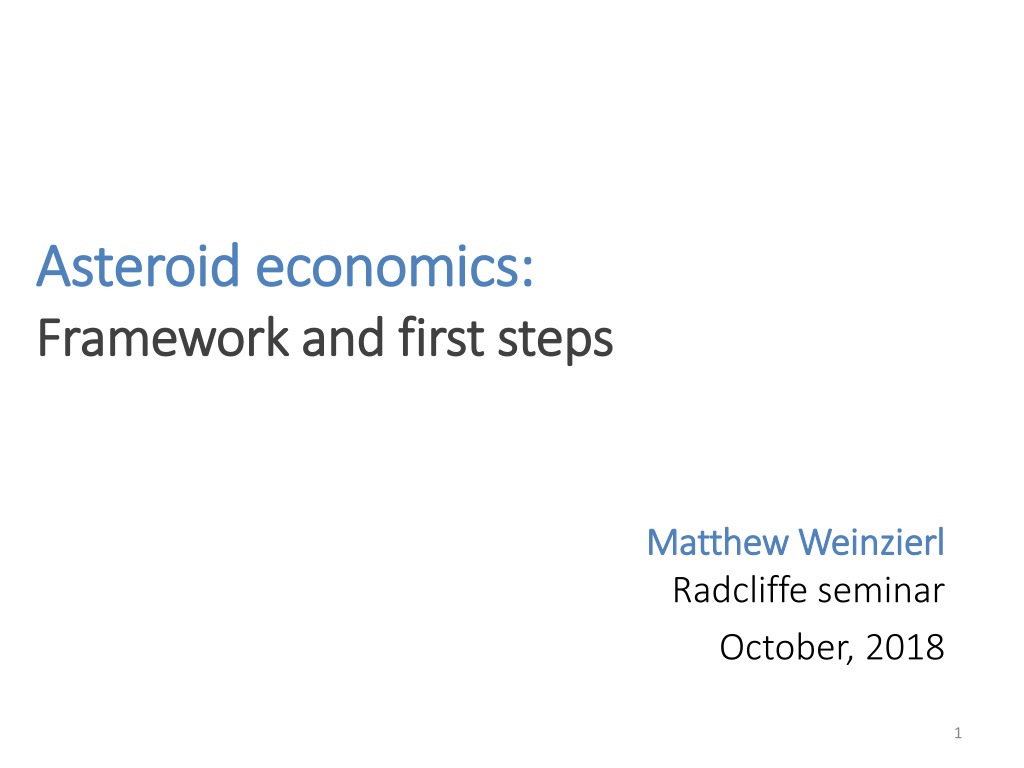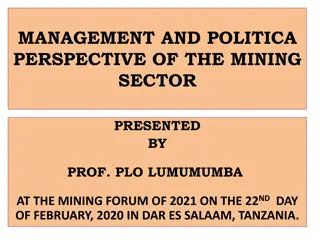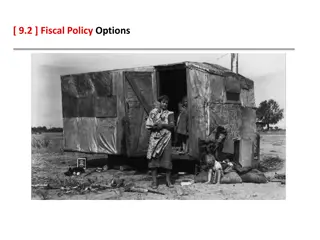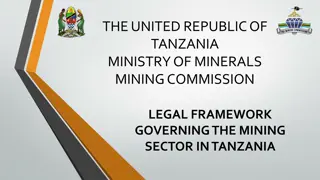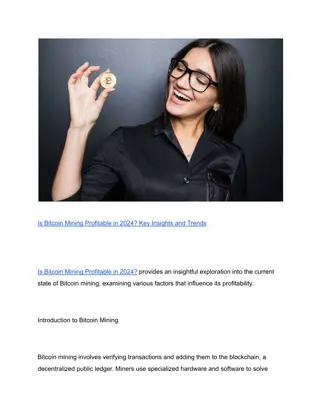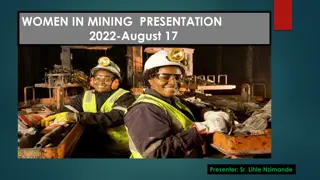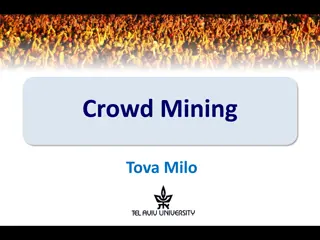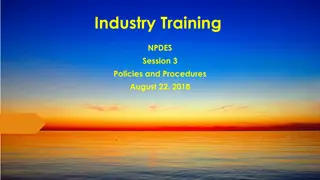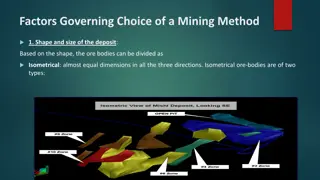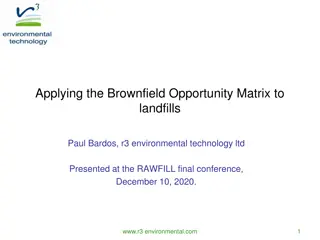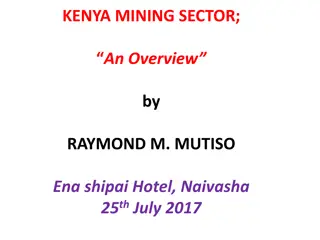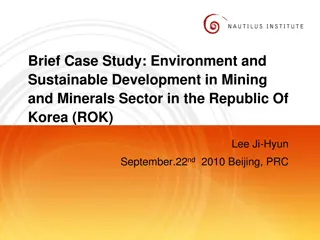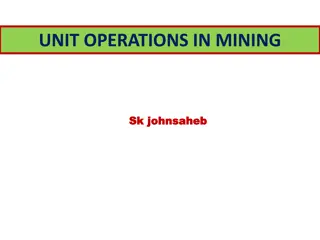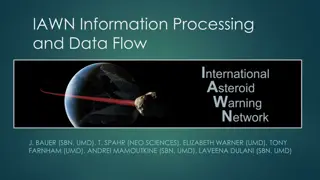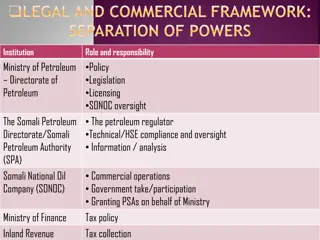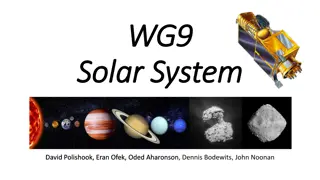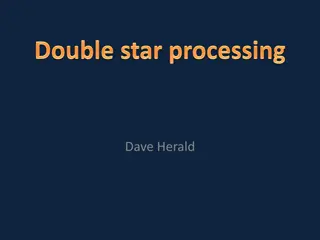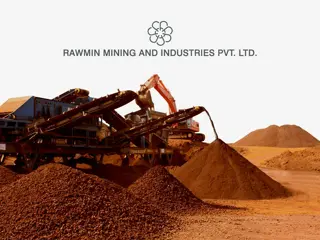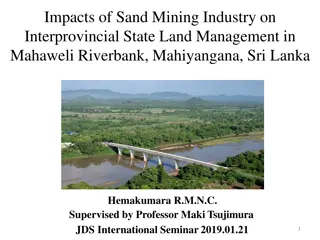Economics of Asteroid Mining: Challenges and Opportunities
Understanding the economics of asteroid mining reveals a complex landscape of supply and demand dynamics, government roles, and investment implications. While some envision a future where space mining fuels interplanetary exploration and sustains life in outer space, practical challenges such as high costs and uncertainties in feasibility studies must be addressed before large-scale economic activity in orbit becomes viable.
Download Presentation

Please find below an Image/Link to download the presentation.
The content on the website is provided AS IS for your information and personal use only. It may not be sold, licensed, or shared on other websites without obtaining consent from the author. Download presentation by click this link. If you encounter any issues during the download, it is possible that the publisher has removed the file from their server.
E N D
Presentation Transcript
Asteroid economics: Asteroid economics: Framework and first steps Framework and first steps Matthew Weinzierl Matthew Weinzierl Radcliffe seminar October, 2018 1
Economics of asteroid mining Economics of asteroid mining 1. The simplest framework: supply and demand Monopolistic variation 2. Prospects Currently, no S and no D Future D guesstimates and value Investment/investor implications 3. Role of government Public goods S&D Age of exploration analogy 2
The simplest framework The simplest framework Supply and Demand basics Plot P vs. Q D is the horizontal sum of individual willingness to pay S is the horizontal sum of individual willingness to provide Equilibrium P, Q is where D=S 3
Existing analyses Existing analyses Some people argue that space mining will be useful, because it will give us resources to use while in space. However, there are three problems with that. Firstly, space mining has been held up as a reason to go to space. The reason for mining cannot then just be "help us do things in space". Secondly, for space mining to become practical the costs of orbital launch must be brought so low that it is no longer worthwhile to mine resources in space! Just launch another BFR! Finally, while people colonizing other planets will, by necessity, need to mine them, the cost of sending minerals from an asteroid to Mars is very similar to the cost of sending minerals from Earth to Mars! So unless you are colonizing that particular asteroid there isn't much point. (Reddit 2018) Future large scale economic activity in orbit is unlikely to develop however until launch cost drops to something in the range $500 to $1,000 per kilogram to LEO. (Mark Sonter, NSS 2006) We were prepared to laugh at the plans proposed by Deep Space Industries and Planetary Resources. But hey, who knows? (qz.com) Some metals could be brought back to Earth, but long term, a major goal of asteroid mining is to use the mined materials in space in order to help construct habitats and to use the asteroids water for both sustaining human beings and as rocket fuel. That means the asteroids themselves become sort of floating pit stops as humans venture farther and farther into the void. Some experts think asteroid mining is actually the entire linchpin of sustaining human life in outer space. (Marketplace 2017) The economic prospects of space mining sound wondrous: a star-scape filled with asteroid fueling stations ready to power the next inter-planetary jump; precious-metal enriched asteroids whose value is greater than the gross domestic product of Tonga. The economic reality of mining in space, though, is much more down to earth: The costs are exorbitant, earth-bound feasibility studies are not highly accurate, and even if they were, they can t be used in space. Until these gaps are closed, it is going to be some time before we can profitably fuel up the old rocket in the garage, load up the snacks and go mine some space platinum. (Investopedia, 2015) 4
Existing analyses Existing analyses Sonter, 1998 Ge and Sahak: 5
We can build a foundation of knowledge We can build a foundation of knowledge Basic research for policy and strategy Scott Pace, Henry Hertzfeld, and the GWU SPI Greg Autry and USC s SCCSI Ken Davidian and COE Alex MacDonald and NASA-supported research Scott Hubbard and New Space Many more 6
We can provide structure to policymaking We can provide structure to policymaking Example from my research: Space, the final economic frontier in J. Econ. Perspectives Ec 101 lesson Adam Smith s invisible hand ; the free market 1st Fundamental Theorem of Welfare Econ A framework for the role of government 1. Establish a decentralized market: COTS and the evolution of LEO 2. Refine the market: complementarities and linchpin technologies 3. Temper the market: ensure that society s goals align with commercial activity 7
Extra slides Extra slides Activities Working group event in 2017 to kick off efforts Funded case-study research effort (with Alissa Haddaji, who s here!) to build a targeted MBA/executive course and space CEO retreat Cambridge Space Group: making Cambridge, MA (MIT, HU, etc.) a hub for thinking about space Making this happen required lobbying Making this happen also required tenure Making this a success will require a collective effort, including interest and cooperation from all of you 8
Example: Space at HBS Example: Space at HBS Activities Working group event in 2017 to kick off efforts Funded case-study research effort (with Alissa Haddaji, who s here!) to build a targeted MBA/executive course and space CEO retreat Cambridge Space Group: making Cambridge, MA (MIT, HU, etc.) a hub for thinking about space Making this happen required lobbying Making this happen also required tenure Making this a success will require a collective effort, including interest and cooperation from all of you 9
How can social scientists help you? How can social scientists help you? Case studies that dissect key issues Space Angels and financing space: how, and how well, does capital get allocated to new space ventures? Planetary Resources and property rights in space: who will profit, and under whose authority, from a developed space economy? Astroscale and space debris: why is debris an unsolved threat, and how might we solve it? Academic research to inform policy and strategy Space: the final economic frontier in Journal of Economic Perspectives sets up economic framework: Establish the decentralized market: COTS Refine the market: complementarities Tempering the market: aligning society and business 10
The plan today The plan today 1. Warmup with data 2. Three puzzling thought experiments 3. Possible resolutions and lessons for policy debates 13
Thought experiment #1 Thought experiment #1 Tax system A Tax system B Think about these situations from the perspective of an objective observer, for example as if you were a policymaker. Given this information, which situation do you think is better?
Thought experiment #1 Thought experiment #1 Why? Can you persuade those who chose the other system?
Thought experiment #1 Thought experiment #1 The classic tradeoff in tax policy is efficiency vs. equality $ But there is a way around this tradeoff: Tax Taxheight height Height is fixed and correlated with wages Redistribution without distortion Optimal height tax for the U.S. is substantial ~10% extra tax for tall men Greater if also tax by race and gender If you reject the idea of a height tax: why? How would you feel about a sight tax? What s the difference? 16
Thought experiment #2 Thought experiment #2 Consider a hypothetical scenario with two persons and a coin-flipper: A coin is flipped to determine who is Person A and B Person A will receive $60,000; Person B will receive $30,000 Together, must pay $18,000 Choose payments made by A and B If one pays >$18,000 the extra is given to the other Image: https://what-if.xkcd.com/19/ How much should A pay? If you said <$24,000, why? In surveys, 50%-70% have A pay <$24,000 17
Thought experiment #3 Thought experiment #3 Consider the following hypothetical situation Situation 1 Situation 2 Money Person F: 5,000 6,000 Person G: 10,000 16,000 Total 15,000 22,000 Well-being Person F: 120 110 Person G: 160 166 Total 280 276 Think about these situations from the perspective of an objective observer, for example as if you were a policymaker. Given this information, which situation do you think is better? 18
Thought experiment #3 Thought experiment #3 How many of you would support: Taxes on polluters that internalize the external costs of pollution? Cigarette taxes that internalize the external costs of smoking? Subsidies that internalize the external benefits of education? Taxes that internalize externalities are popular They discourage activities that cause external costs By this logic, we should tax high incomes because envy exists Envy means high earners exert costs on everyone else Envy : high-income earners as Environmental damage : polluters Right? 19
The plan today The plan today 1. Warmup with data 2. Three puzzling thought experiments 3. Possible resolutions and lessons for policy debates 20
Recap Recap 1. We reject height taxation but accept sight taxation 2. We want to offset luck but not always, or at least not entirely 3. We accept redistribution but not to accommodate envy How do we explain these reactions? 21
Possible explanation Possible explanation An answer can be found by asking: What are we trying to achieve with economic policy? A wide range of evidence suggests people support more than one principle when making judgments on economic policy My own research, plus evidence from political scientists, psychologists, sociologists, and other economists I call this idea Normative Diversity Let s consider two broad, competing principles, roughly: A. We re in this together B. We re together by choice 22
Two broad, competing principles Two broad, competing principles A: We re A: We re in this Policy should maximize overall wellbeing The lucky should pay taxes to support the unlucky Veil of Ignorance (Rawls, 1971) in this together together B: We re together by choice B: We re together by choice Policy should share the costs of government fairly Taxes should match the benefit of what the state does Libertarianism (Nozick, 1974) If people find both A and B appealing, the results of our thought experiments can be explained: 1. We reject height taxation but accept sight taxation 2. We want to offset luck but not always, or at least not entirely 3. We accept redistribution but not to accommodate envy 23
Two broad, competing principles Two broad, competing principles A: We re A: We re in this Policy should maximize overall wellbeing The lucky should pay taxes to support the unlucky Veil of Ignorance (Rawls, 1971) in this together together B: We re together by choice B: We re together by choice Policy should share the costs of government fairly Taxes should match the benefit of what the state does Libertarianism (Nozick, 1974) In fact, both of these principles are reflected in current policy: Federal income tax Federal income tax State and local tax State and local tax 24
A final puzzle A final puzzle Principle A was: Policy should maximize overall wellbeing. Why would we want something other than that? Perhaps just an ideological, philosophical belief But many would be uncomfortable with that Many of you are uncomfortable with that in debates over policy in the real world I think there s an explanation that can satisfy both sides Or, at least, get them to appreciate each other better 25
An Analogy from Individual Ethics An Analogy from Individual Ethics Consider the choice of whether to tell a lie When we consider lying, we weigh the costs and benefits One component of the costs is the remorse we feel if we violate the rule: do not lie This remorse raises the cost of lying beyond the direct costs of the lie; it makes us lie less often Why do we tip the scales in this way? 26
Rule Utilitarianism Rule Utilitarianism This sort of rule is probably very valuable to society, right? This type of moral reasoning is called rule utilitarianism Ethical rules are important because they carry information about the broader effects of our actions If we knew the complete effects of our actions, we wouldn t need rules like don t lie But we don t, so we hand down across generations ethical rules that capture the wisdom gained from experience 27
Rule Utilitarianism in Policymaking Rule Utilitarianism in Policymaking The same idea holds for policymaking We can t trace the complete effects of policy So, we use principles (rules) to take into account the wisdom society has gained from the past Take the example of redistribution to accommodate envy Would a society that did this thrive? We may not know what would go wrong, but we know something would 28
Implications for policy debates Implications for policy debates Debates over policy are not about just direct costs and benefits Also about what we have learned from our past; what makes for a good society; what rules we should pass on to the future These considerations are not distractions; they carry information that should be a part of cost-benefit calculations The rise of populism (Brexit, Trump, Le Pen) may be (in part) explained by technocrats forgetting the importance of principles Fortunately, this can be fixed with a bit of intellectual humility, an open mind, and a lot of careful listening He who knows only his own side of the case knows little of that. J.S. Mill 29
